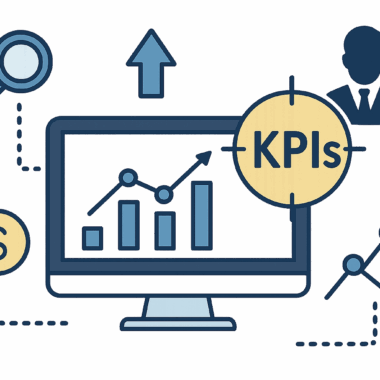

Affiliate Marketing KPIs: How to Track and Improve Performance

Content:
- What Are KPIs in Affiliate Marketing?
- Why KPIs Matter in Affiliate Program Management
- Top Affiliate Marketing KPIs to Track
- How to Track Affiliate KPIs Effectively
- Common Mistakes When Measuring Performance
- How to Improve Your Affiliate Marketing KPIs
- Conclusion
- FAQ
Performance measurement is a critical component of any marketing strategy, and affiliate marketing KPIs are essential for evaluating success. As competition intensifies and customer acquisition costs rise, companies must rely on measurable indicators, or affiliate program KPIs, to track affiliate KPIs and measure affiliate program performance effectively. These affiliate performance metrics provide actionable data that can guide optimization, improve ROI, and enhance long-term outcomes for affiliate programs.
Affiliate marketing KPIs allow program managers to evaluate partner performance, track campaign efficiency and track affiliate KPIs, and allocate resources where they yield the highest return. Without precise KPI tracking, affiliate initiatives risk becoming inefficient, opaque, or misaligned with business goals. This article outlines the essential KPIs, methods to track them accurately, and proven strategies to improve results.
What Are KPIs in Affiliate Marketing?
Affiliate marketing KPIs, also known as affiliate performance metrics, are quantifiable indicators that help businesses assess how effectively their affiliate partnerships contribute to revenue generation and strategic growth. These indicators highlight what works and where adjustments are needed, ensuring that affiliate campaigns are aligned with broader marketing objectives and measurable through affiliate marketing metrics.
Unlike general traffic or branding metrics, KPIs in affiliate marketing are focused on measurable, conversion-related outcomes. They help distinguish high-performing affiliates from underperformers, assess the profitability of different campaigns, and establish benchmarks for future optimization efforts.
Why KPIs Matter in Affiliate Program Management
Managing an affiliate program without tracking affiliate program KPIs is like operating without a compass. Without clear affiliate marketing KPIs and affiliate performance metrics, it becomes nearly impossible to measure affiliate program performance or understand what drives revenue. Proper KPI tracking allows affiliate managers to track affiliate KPIs, make informed decisions, and optimize program efficiency.
Moreover, clear KPIs foster accountability across all stakeholders. Affiliates understand expectations, marketing teams can track ROI, and executives receive performance reports that justify budget allocation. This transparency strengthens relationships, improves campaign quality, and drives predictable growth.
Top Affiliate Marketing KPIs to Track
Below are the most important KPIs to monitor when managing an affiliate program:
- Conversion Rate: Percentage of referred traffic that completes a desired action (purchase, signup, etc.).
- Click-Through Rate (CTR): Ratio of clicks to impressions on affiliate links.
- Earnings Per Click (EPC): Revenue generated per click, a key profitability metric.
- Average Order Value (AOV): Mean value of purchases driven by affiliates.
- Cost per Acquisition (CPA): Average cost to acquire a customer through affiliate efforts.
- Active Affiliates: Number of affiliates who have generated at least one action in a defined period.
- Return on Investment (ROI): Total revenue from affiliates divided by total affiliate spend.
- Churn Rate: Percentage of affiliates who stop promoting the program within a specific timeframe.
KPI Overview Table
|
KPI |
Description |
Purpose |
| Conversion Rate | % of users who convert | Measures affiliate traffic quality |
| CTR | Clicks / Impressions | Evaluates ad or link engagement |
| EPC | Earnings per click | Indicates affiliate profitability |
| AOV | Avg. order size | Helps optimize commissions and pricing |
| CPA | Cost per customer | Evaluates acquisition efficiency |
| Active Affiliates | Count of engaged affiliates | Monitors network health |
| ROI | Revenue vs. spend | Measures overall program success |
| Churn Rate | Lost affiliates / Total | Reveals retention challenges |
How to Track Affiliate KPIs Effectively
Accurate tracking of affiliate marketing KPIs begins with the right technology. Using affiliate marketing software allows you to track affiliate KPIs, automate link tracking, capture conversions, and generate reliable reports. Integrating these tools with CRM systems and analytics platforms ensures accurate affiliate marketing metrics and helps you measure affiliate program performance effectively. These tools eliminate human error and enable real-time data access.
To ensure reliability:
- Integrate affiliate platforms with your CRM and analytics tools
- Use multi-touch attribution models to capture full customer journeys
- Validate tracking scripts and ensure compliance with browser privacy rules (e.g., ITP, ETP)
- Customize reports to align with campaign objectives and affiliate tiers
Reliable data drives smarter decisions and prevents misleading insights from skewing performance evaluations.
Common Mistakes When Measuring Performance
Many affiliate programs struggle with misinterpreting or misusing performance data. A frequent error is focusing on vanity metrics such as total clicks or traffic volume, which provide little insight into revenue impact.
Other common mistakes include:
- Ignoring attribution windows, leading to lost conversions
- Overlooking low EPC affiliates who consume resources but generate minimal returns
- Failing to segment affiliate performance by traffic source or promotion method
- Neglecting to adjust benchmarks as the program scales
Avoiding these pitfalls requires both strategic discipline and technical accuracy in KPI reporting.
How to Improve Your Affiliate Marketing KPIs
Improving KPIs involves both structural and tactical changes. Begin with affiliate segmentation: identify your top performers and offer them tailored commission structures or exclusive promotions. Remove or reassign underperformers.
Practical optimization strategies include:
- A/B testing promotional content and landing pages
- Offering performance bonuses for high-quality traffic
- Enhancing creative assets for mobile and cross-platform use
- Adjusting cookie durations and attribution models to reflect real user behavior
Constant iteration and feedback loops are key. As your affiliate network matures, KPI baselines should be reviewed and optimized accordingly.
Conclusion
Affiliate marketing KPIs provide the foundation for sustainable program growth. They inform performance evaluations, budgeting, and strategic direction. Without measurable indicators, businesses risk overspending, underperforming, and damaging affiliate relationships.
By tracking the right KPIs and acting on data insights, marketers can scale their programs with precision, retain high-value partners, and achieve greater profitability across affiliate channels.
FAQ
- What is the most important KPI in affiliate marketing?
While it varies by goal, Earnings Per Click (EPC) and Conversion Rate are typically the most telling indicators of affiliate value. - How often should KPIs be monitored?
Key metrics should be reviewed weekly, with monthly deep-dives and quarterly performance reviews. - Can small affiliate programs benefit from KPI tracking?
Yes. Even in early stages, tracking KPIs helps validate strategies and refine partner relationships. - Which tools are best for affiliate KPI tracking?
Platforms like Impact, PartnerStack, Refersion, and Post Affiliate Pro offer robust KPI monitoring features. - How can I tell if my affiliates are underperforming?
Low EPC, high churn rate, and declining CTRs are clear indicators that affiliates may need support or replacement.

Lead Distribution Explained: How Smart Routing Increases ROI
Lead distribution is a foundational process in revenue operations that directly affects conversion rates, sales efficiency, and overall profitability. In competitive digital markets, generating leads is no longer enough - how those leads are assigned and processed determines whether marketing investments translate into revenue.





